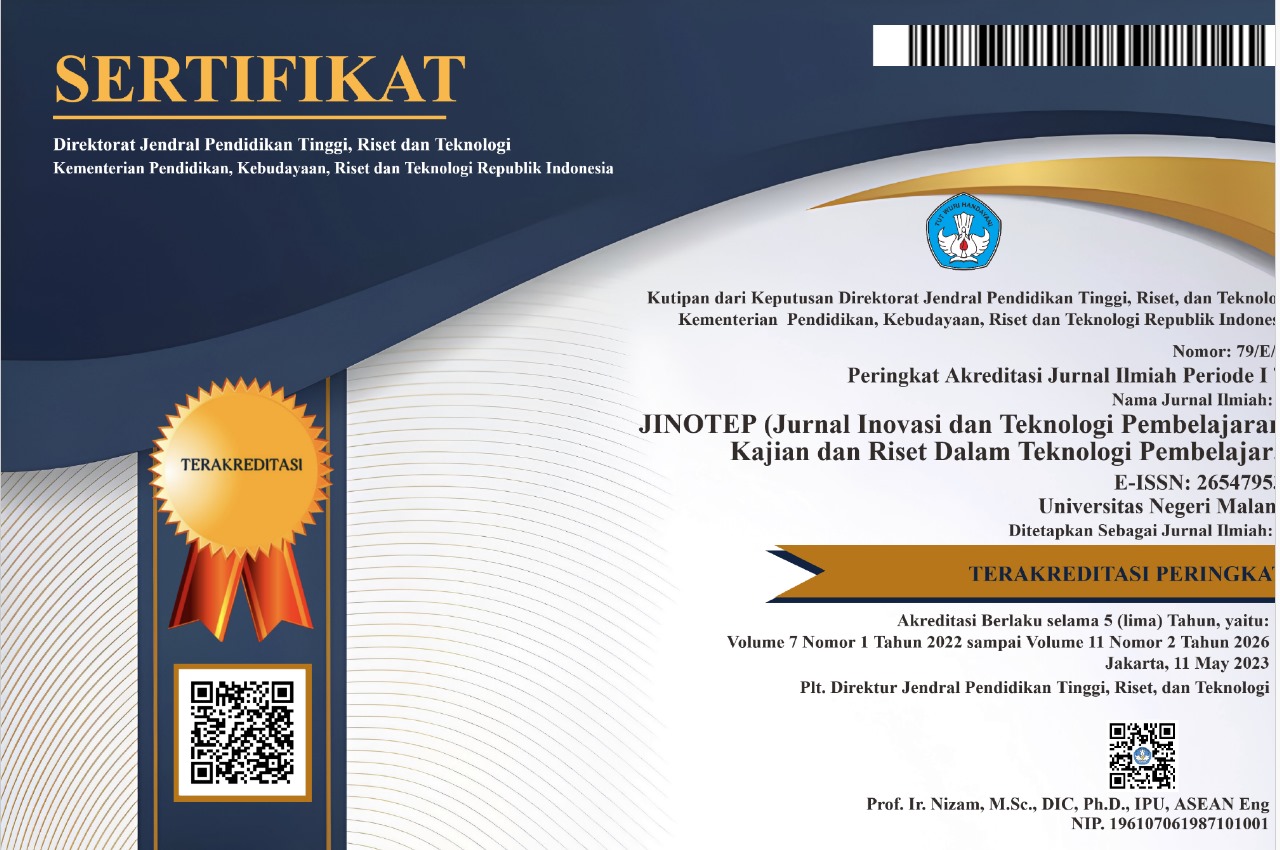Analysis of The Formative Assessment Planning During Online Learning: A Case Study
Abstract
Abstrak: Penelitian ini bertujuan untuk menganalisis perencanaan penilaian formatif guru mata pelajaran bahasa Inggris dalam pembelajaran online di SMP Negeri 1 Singaraja. Penelitian ini menggunakan deskriptif kualitatif, lima Guru bahasa Inggris di SMP Negeri 1 Singaraja dipilih menjadi subjek dalam penelitian ini. Subjek dipilih dengan teknik purposive sampling. Metode pengumpulan data yang digunakan yaitu studi dokumen dan wawancara. Hasil penelitian menunjukkan bahwa semua guru bahasa Inggris sudah mengintegrasikan perencanaan penilaian formatif ke dalam rencana pembelajaran. Teknik penilaian formatif yang disiapkan oleh guru bahasa Inggris dalam pembelajaran online yaitu teknik bertanya, penugasan formatif, ulangan harian, diskusi, dan penilaian diri. Hasil penelitian ini juga menunjukan bahwa dimensi kriteria keberhasilan masih perlu diperhatikan dan ditingkatkan guna memaksimalkan manfaat penilaian formatif dalam pembelajaran online.
Abstract: This study aimed at analyzing the teachers’ formative assessment planning for English subject in online learning at SMP Negeri 1 Singaraja. This study used qualitative descriptive research design. fives English teachers at SMP Negeri 1 Singaraja were used as subject in this study. The subjects were chosen by purposive sampling technique. The data collection methods employed were document study and interview to answer the research question qualitatively. The findings showed that all English teachers successfully integrated formative assessment planning into their lesson plan. There were formative techniques that appear in the lesson plan, such as questioning technique, formative task, daily test, online discussion, and self-assessment. This results of the study also showed that the dimensions of success criteria still need to be considered and improved in order to maximize the benefit of formative assessment in online learning.
Keywords
Full Text:
PDFReferences
Arise, N. (2018). The Effectiveness of Small Group Discussion Method in The Teaching of Reading Comprehension. 20400113002.
Atmowardoyo, H. (2018). Research Methods in TEFL Studies: Descriptive Research, Case Study, Error Analysis, and R&D. Journal of Language Teaching and Research. 9(1). 197-204.DOI: http://dx.doi.org/10.17507/jltr.0901.25
Carless, D. (2012). From Testing to Productive Student Learning: Implementing Formative Assessment in Confucian-heritage Settings. New York: Taylor & Francis. Retrieved from https://books.google.com.au/books?id=7trFBQAAQBAJ
Creswell, J. W. (2012). Educational research (4th ed.). Boston, MA: Pearson Education, Inc
Chappuis, J. (2015). Seven strategies of assessment for learning (2nd ed). Upper Saddle River, N.J: Pearson Education.Black, P., & Wiliam, D. (1998). Assessment and classroom learning. In International Journal of Phytoremediation (Vol. 21, Issue 1). https://doi.org/10.1080/0969595980050102
Defianty, M. (2018). The practice of formative assessment by EFL teachers in secondary high school in Indonesia.
Heale, R., & Forbes, D. (2013). Understanding triangulation in research. Evidence-Based Nursing, 16(4), 98. https://doi.org/10.1136/eb-2013-101494
Andrade, H. L., & Heritage, M. (2017). Using Formative Assessment to Enhance Learning, Achievement, and Academic Self-Regulation. In Using Formative Assessment to Enhance Learning, Achievement, and Academic Self-Regulation. https://doi.org/10.4324/9781315623856
Kang, H., Thompson, J., & Windschitl, M. (2014). Creating opportunities for students to show what they know: The role of scaffolding in assessment tasks. 98(4), 674-704. doi:10.1002/sce.21123
Kemendikbud Republik Indonesia. (2020). Model penilaian formatif. 64.
Kenyon, B. J. (2019). Teachers ’ Formative Assessment Use to Check for Understanding and to Adjust Instruction. Walden Dissertation and Doctoral Studies, February.
Lesmana, N., & Rokhyati, U. (2020). The Implementation of Doing Self-Assessment in Higher Education. Journal of English Language Studies, 5(1), 60–72. http://jurnal.untirta.ac.id/index.php/JELS
Leibold, N., & Schwarz, L. M. (2015). The art of giving online feedback. Journal of Effective Teaching, 15(1), 34–46. http://ezproxy.ace.edu/login?url=http://search.ebscohost.com/login.aspx?direct=true&AuthType=ip,uid&db=eric&AN=EJ1060438&site=eds-live&scope=site
McCarthy, J. (2017). So all can learn: A practical guide to differentiation. Lanham, MD: Rowman & Littlefield.
McLaughlin, T., & Yan, Z. (2017). Diverse delivery methods and strong psychological benefits: A review of online formative assessment. Journal of Computer Assisted Learning, 33, 562–574. ://dx.doi.org/10.1111/jcal.12200
Mohamed Jamrus, M. H., & Razali, A. B. (2019). Using Self-Assessment as a Tool for English Language Learning. English Language Teaching, 12(11), 64. https://doi.org/10.5539/elt.v12n11p64
Muhsin, Muh Arief. (2016). Teknik Penilaian Dalam Pembelajaran Bahasa. Retrieved from https://adoc.pub
Nishanthi, R. (2018). The Importance of Learning English in Today World. International Journal of Trend in Scientific Research and Development, Volume-3(Issue-1), 871–874. https://doi.org/10.31142/ijtsrd19061
Ogange, B. O., Agak, J., Okelo, K. O., & Kiprotich, P. (2018). Student Perceptions of the Effectiveness of Formative Assessment in an Online Learning Environment. Open Praxis, 10(1), 29. https://doi.org/10.5944/openpraxis.10.1.705
Perera-Diltz, D. M., & Moe, J. (2012). Online instruction of counselor education coursework: Maximizing strengths and minimizing limitations. Ideas and Research You Can Use: VISTAS.
Pusat Asesmen dan Pembelajaran Kementerian Pendidikan dan Kebudayaan. (2020). Buku Saku Asesmen Diagnosis Kognitif Berkala.
Jiang, Y. (2014). Exploring teacher questioning as a formative assessment strategy. RELC Journal, 45(3), 287-304. doi:10.1177/0033688214546962
Sugiyono. (2018). Metode Penelitian Kombinasi (Mixed Methods). Bandung: CVAlfabeta.
Wiliam, D. (2013). Assessment: The bridge between teaching and learning. Voices from the Middle, 21(2), 15-20. Retrieved from https://www.ncte.org
Wylie, C., Lyon, C., & Formative Assessment for Students and Teachers (FAST) State Collaborative on Assessment and Student Standards. (SCASS). (2016). Using the formative assessment rubrics, reflection and observation tools to support professional reflection on practice. Washington, DC: Council of Chief State School Officers.
DOI: http://dx.doi.org/10.17977/um031v8i22021p157
Refbacks
- There are currently no refbacks.
Copyright (c) 2021 Agus Toni Mahendra, Ni Luh Putu Eka Sulistia Dewi, Luh Gede Eka Wahyuni

This work is licensed under a Creative Commons Attribution-ShareAlike 4.0 International License.
======================================================================
Jurnal Inovasi dan Teknologi Pembelajaran published by Universitas Negeri Malang in collaboration with the Asosiasi Program Studi Teknologi Pendidikan Indonesia (APS TPI) and Ikatan Profesi Teknologi Pendidikan Indonesia (IPTPI) with a MoU.
Publisher Address:
Educational Technology Laboratorium, Building D5, 1st Floor
Faculty of Education, Universitas Negeri Malang
Semarang St. No. 5, Malang City, East Java Province, Postal Code 65145
Email: jinotep.fip@um.ac.id
======================================================================

JINOTEP is licensed under a Creative Commons Attribution-ShareAlike 4.0 International License.
JINOTEP Statistics (Since July 13th, 2020)



.png)




.png)
1.png)
1.png)
4.png)
2.png)
1.png)
1.png)
.png)


_3.png)





1.png)
.png)